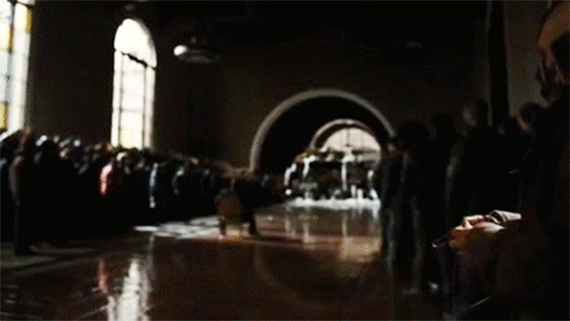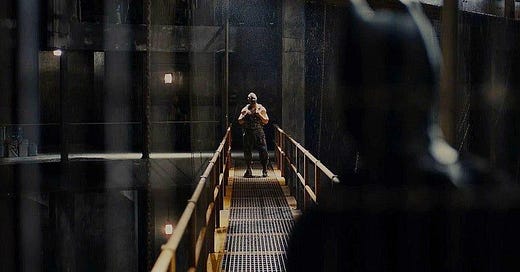Underrated Gems #1: The Dark Knight Rises (2012)
Directed by Christopher Nolan. Written by Jonathan & Christopher Nolan.
Underrated Gems is a new series that focuses on films that either have gotten an unfair bad rap over the years or great films that were severely underseen upon release.
-Spoilers for The Dark Knight follow-
In the realm of great cinematic literary adaptations, many notable films spring to mind: John Huston’s Moby Dick, John Ford’s The Grapes of Wrath, The Coen Brothers’ No Country for Old Men- the list goes on and on. The ones I have just listed, while exceptional in their execution, pretty much follow along the standard procedure for adaptations of popular books: the principle held by the director in making the film is to make the book come to life as close to the author’s words as possible. In the age of the Internet and the wake of popular franchises such as Harry Potter it has become common to see people on Twitter complaining about differences between films and their “far superior” source material. And while there is critical validity in wanting a film adaptation to respect the original story, I think that it is quite limiting to the potential of cinema in how it can adapt a great book.
For my B.A. in English Language & Literature I wrote my senior thesis on the 1979 film Apocalypse Now and how it adapts Joseph Conrad’s novella Heart of Darkness. In it, I argued that the best thing a movie can do in adapting a classic novel is not to create a 1:1 replica of the original: the book will always be the definitive version of the story. However, it is possible to take the things that make a story great: the themes, certain plot points and characters, and transfer them to a new setting and time entirely, therefore bypassing the previous criticism mentioned before. Films that do this well besides Apocalypse Now include Yojimbo, Miller’s Crossing, Ran, and West Side Story, to name a few.1
Another I would include among these is 2012’s The Dark Knight Rises, a film that, while received well by critics, was perceived by many fans of The Dark Knight as a letdown in the wake of the latter film’s monstrous success. I would argue in fact that The Dark Knight Rises stands as not only one of the greatest superhero films of all time, but also one of the best adaptations of Charles Dicken’s classic novel A Tale of Two Cities.
This is not conjecture on my part: Jonathan Nolan from the start of his initial draft really did base the film on the 1859 novel. It may not be wholly apparent at first, but once you start to look for the allusions it becomes easier to connect the dots (two minor characters, Stryver and Barsad are named from characters from the book). One of the last lines in the film is a direct quote from the end of the novel.

The story of The Dark Knight Rises is, like the Dickens novel, centered on revolution, with the villain Bane (Tom Hardy) threatening to incite the largest revolution Gotham City has ever seen. At this point, Gotham has not seen or heard from “the Batman” for eight years since the events of The Dark Knight, and has undergone a pax Gotham of sorts by the passing of the “Dent Act,” the last work of the late Harvey Dent aka Two-Face. Commissioner Gordon (Gary Oldman) has kept the public from knowing about Harvey’s tragic last few days in order to ensure that the act remains enforced. The blame for the crimes committed by Dent fall on Batman (Christian Bale) by his choice at the end of the last film: Bruce Wayne is now a crippled recluse.
Bane’s plan is initiated in an astounding opening sequence designed specifically to be viewed in IMAX, and is a loving nod to Nolan’s beloved Bond films. Hardy’s muscular villain then achieves his hostile takeover by taking over the stock market and then the Wayne Foundation, thus removing Batman’s greatest resource: his wealth. By the time Bruce Wayne inevitably decides to return as Batman, even his butler Alfred (Michael Caine) is skeptical (“I’ve sewn you up, I’ve set your bones, but I won’t bury you.”)
But that makes it all the more exciting to see how the Dark Knight indeed rises, and to see a city that had been resting on its laurels for so many years to rise as well to challenge the overwhelming tyranny of Bane.
There’s a quote from C.S. Lewis that I keep as my phone wallpaper that I think perfectly encapsulates this film’s theme of perseverance even after great failure:
After each failure, ask forgiveness, pick yourself up, and try again. Very often what God first helps us toward is not the virtue itself but just this power of always trying again.2
Hardy’s Bane offers the people of Gotham false freedoms (“We take Gotham from the corrupt, and we give it to you- the people”) in hopes of turning them against the civic authority, especially the police. Despite jails being opened and rampant looting, no one in the city feels free, instead living in terror. Deputy Commissioner Foley (Matthew Modine) fails to protect Gotham, choosing early on to chase the now-mythical Batman, but in the end even he is able to redeem himself simply by “picking himself up and trying again.”
The Dark Knight Rises is a complex film that explores, in conjunction with the previous two films’ themes of fear and escalation, what it truly means to be a hero, with Bruce Wayne facing not only his toughest villain yet but also coming to terms with the traumatic events of his past, both buried and recent. Like the Dickens novel before it, Rises explores the dangers of a society left unchecked by any social mores and why everyone has the ability to be a hero if he or she is brave enough to stand up for what is right. It’s the rare superhero film that gives a fitting send-off to a beloved character in a powerful and poignant way. Anyone who has this on the lower end of their Nolan rankings ought to give this one another try.
One could argue that Star Wars falls under this category as a not-so-subtle adaptation of Dune
Quote is originally from Lewis’ excellent book Mere Christianity






I consider The Dark Knight Rises to be my favorite comic book movie ever and one of the all-time greatest superhero films (I love Unbreakable and The Incredibles even more). Most people think this is inferior to The Dark Knight but I definitely don't agree. In fact, I believe this film redeems its predecessor, a masterfully made movie that was ruined by its morally compromised ending that the ends justifies the means. If I were to write an essay, I would have to include both films because they only work together.
I did not consider The Dark Knight Rises as an indirect adaptation of A Tale of Two Cities, but I haven't read that book either. For whatever reasons, we didn't read Dickens in high school so I read one of his novels (Great Expectations) on my own a few years after graduating and that's it. I might have heard about the connection in the movie's Blu-ray special features, but I don't remember exactly.
Thank you very much for writing this essay.
P.S. Apocalypse Now is one of my favorite war movies and I read Heart of Darkness because of it.